Project Management Certification Salary: What to Expect in 2021?
If you are an aspiring project manager, you probably already know that the labor market is never short of project managers. But, how can you set yourself apart in your industry and land a job with high earning potential?
Project Management Professional (PMP) certification is one of the most effective ways to prove your proficiency in managing projects and, of course, to attract large pay scales. No matter the size and complexity of a project, a PMP certified project manager is trusted to demonstrate top-notch project management skills and techniques.
Now, what does 2021 have in store for PMP professionals? How impressive is the average PMP salary this year? What is the project management certification salary range across the globe? Keep reading to find out.
Why Should You Choose the Project Management Career Path?
Project management is ultimately about having proactive control over a project from the beginning to the end. Planning and managing projects while mitigating associated risks is no simple feat.
Here is why treading the project management path is a rewarding experience
1) There is a growing demand for project managers
According to a study conducted by Project Management Institute, by 2027, the demand for project managers is expected to increase by 33 percent. The report states that there will be around 22 million jobs in the field by then.
2) Project managers are paid impressive salaries
Project management is a career path that provides plenty of room for advancement and growth. That is, your pay scale will grow as you grow. A project management certification-holder’s salary is twenty percent more than a non-certified project manager’s salary.
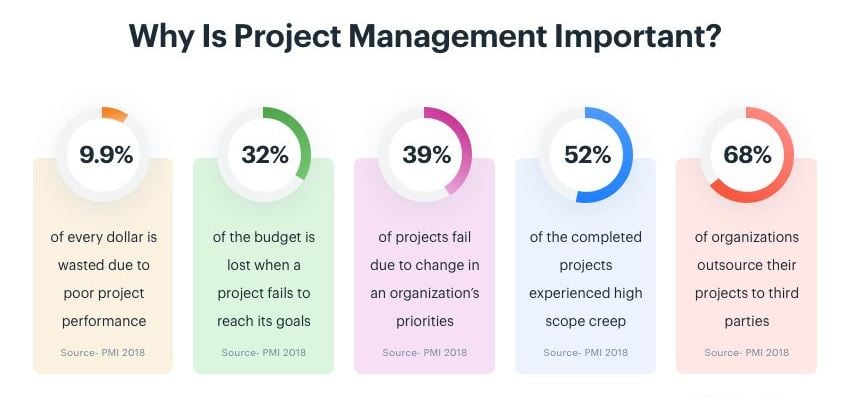
Source: Kissflow
3) Project management allows for growth
From junior roles to executive levels, there are plenty of positions in project management. Here are some popular roles:
- Project Manager ─ A project manager supervises projects from start to finish; they oversee budgets, demonstrations, schedules, and more.
- Assistant Project Manager ─ An assistant project manager assists a project manager in tackling large projects.
- Senior Project Manager ─ A senior project manager is responsible for handling multiple projects and prioritizing the requirements of projects. He or she manages a team that takes care of individual projects.
- Project Scheduler ─ A project scheduler is responsible for managing the schedules of projects using project management software.
- Project Coordinator ─ This is an entry-level position; a project coordinator’s role is administrative in nature as it assists the management team.
4) Project management is an inevitable position
Effective project management is essential for the success of every organization; the path is not tied to a specific industry. All organizations, irrespective of their niches, will always seek project managers.
What Makes PMP Certification an Important Credential?
A Project Management Professional certification is the most popular choice of project managers. These days, organizations even use the credential as criteria to filter their candidate pools. It is also one of the easiest ways for you to be recognized as an expert. Here is why PMP certification is important:
- In order to be certified, candidates go through rigorous training and exposure to real-life situations. This helps them tackle complex problems.
- A PMP professional adds great value to the organization; he or she can increase the credibility of the organization with top-notch project management skills.
- A certified PMP professional can increase customer satisfaction by delivering sustainable solutions for complex challenges.
- PMP professionals can meticulously complete projects on time and within budget constraints.
- The project management certification salary is impressive across all industries.
Why Is Project Management Salary Important?
There are several questions that all aspiring project managers need to ask themselves before embarking on their career journey. While the idea of becoming a project manager is exhilarating, it is also important to consider the earning potential.
Are you willing to work your way up the project management ladder? Would your lifestyle suit the earning potential of this career path? These critical questions should help you determine your choice of career.
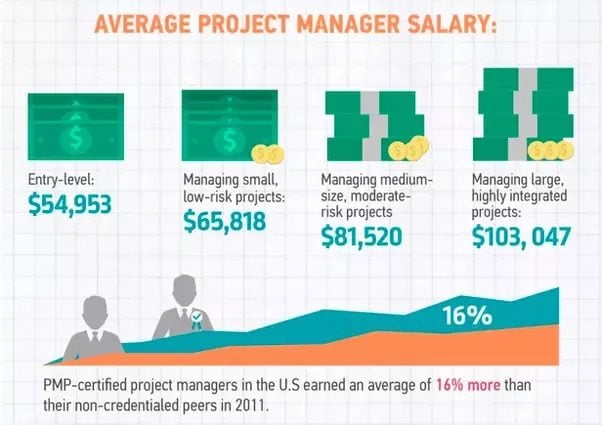
Source: Quora
The average salary earned by a project manager in the US is $116,000 a year. But, ultimately, your earning potential comes down to your hands-on project management experience, your location, your educational background, and other credentials.
If you are a beginner, the idea of working your way up the ladder might seem very challenging. But, there is no need to be disheartened. Project management is one of the most rewarding career paths, if you are willing to work hard. Additionally, a project management certification holder's salary is much higher than normal wages. So, getting PMP certified is definitely a foolproof way to improve your salary.
Here is a comparison of the annual average salaries of some popular Project Manager roles in the U.S.
- Portfolio Manager ─ $138,000
- Program Manager ─ $125,000
- Project Manager Consultant ─ $120,000
- Project Manager Specialist ─ $92,221
- Director of Project Management ─ $144,000
Project Management Certification Salary Across the Globe
The following is the average annual salary of Project Managers according to the eleventh edition of the Project Management Institute’s salary survey.
- United States ─ $116,000
- Australia ─ $101,380
- Germany ─ $96,987
- United Kingdom ─ $83,410
- New Zealand ─ $81,196
- Canada ─ $73,355
- Singapore ─ $71,279
- France ─ $68,663
- Hong Kong ─ $76,607
- Saudi Arabia ─ $63,944
6 Factors That Affect Project Management Salary
On average, a project manager clocks in forty hours every week; this is a global standard. But, they are not paid the same everywhere. It is imperative to understand the salary landscape before you set out to become a project manager. Several variables influence the pay scale of a project manager. Here is a detailed look at them:
1) Location
The location of your organization has a significant impact on your pay scale. This includes the overall desirability of the location and the cost of living. According to a survey by ZipRecruiter, project management jobs in New York, Boston, and San Francisco tend to offer high-paid opportunities. But, in the post-COVID job market, project managers are given remote working opportunities; organizations such as Amazon, Oracle, HubSpot, and United Health Group have already started looking for remote managers.
2) Education
It goes without saying that education is the foundation upon which you build your career. Having advanced degrees certainly pays off in a project management career. Not only can a degree fetch you more money, it can also help you remain employable and competitive in your industry. While a doctoral degree can earn you $123,000, a master’s degree and a four-year bachelor’s degree can fetch you $120,000 and $110,250, respectively.
3) Experience
If you are just starting your career in project management, your salary will be at the lower end. But, after you acquire considerable experience in the field, your pay scale will become impressive. The greater your hands-on project experience, the higher your salary will be. The trick is to choose different kinds of projects that will challenge you and give you ample experience to become a better project manager.
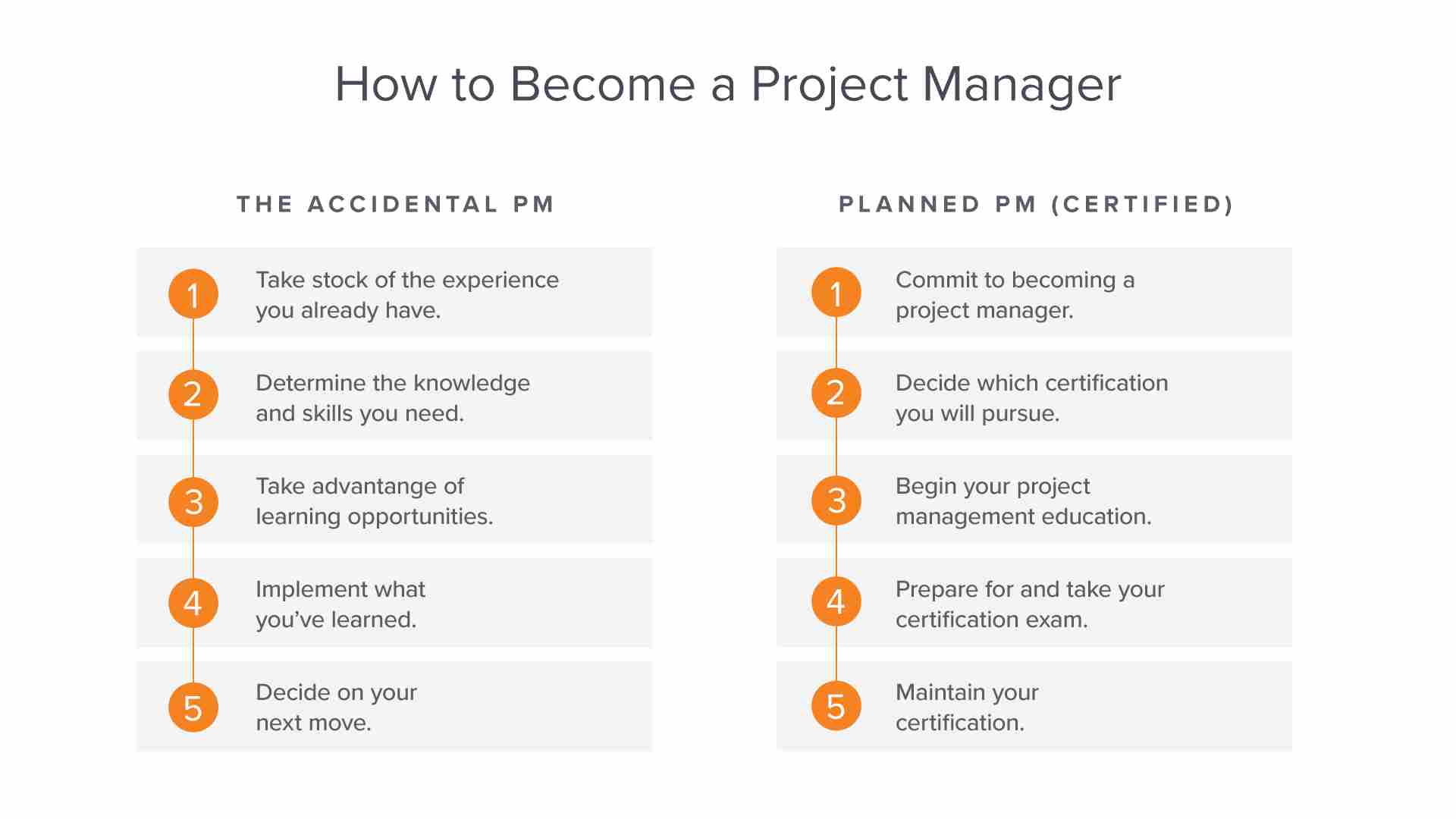
Source: Workfront
4) The Size of Your Team and Organization
The size of your company and your team can influence your pay scale. The larger the organization, the higher your salary. According to PMI, a company that has more than ten thousand employees can, on average, pay $120,000 to a project manager while a smaller organization, with less than hundred employees, will only pay $111,000.
5) Project Management Methodology
According to the Project Management Institute, the methodology employed to manage projects has an impact on the project management salary range. PMI found that project managers who used ‘extreme project management techniques’ earned more than their counterparts who used common waterfall techniques.
6) Designation
Your job title is one of the biggest factors that influences your salary. The higher you move up the project management career ladder, the higher your pay will be. For instance, the project management consultant salary is lower than that of a senior program manager. Make sure you work hard for your career mobility. Project management is a career path that offers great potential for growth.
10 Tips to Improve Your Project Management Salary
Whether you are an experienced project manager or a beginner who is just starting to build your project management career, there are tips to improve your pay scale. Here are tips to improve your project management salary:
1) Choose Your Specialization Wisely
There are several areas of specialization that you can choose from on the project management path. Each offers different pay scales. If you are flexible enough and want to prioritize salary, you can choose the field that pays the highest.
- Portfolio Manager ─ A portfolio manager earns around $141,000 every year in the US. In this role, you will be responsible for supervising the projects of a company, delegating tasks and responsibilities, and allocating resources to team members. $141,000 is the average base salary of a portfolio manager.
- Program Manager ─ As mentioned before, a program manager is responsible for handling a number of related projects; program managers in the US earn a base salary of $128,000, on average.
- Project Manager ─ A project manager oversees projects from the planning stage to the closing stage. Their average annual salary is $91,000 in the US.
2) Work on Big, Complex Projects
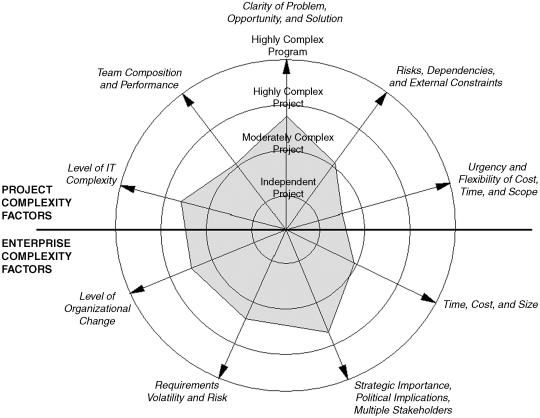
Source: OREILLY
The greater your responsibilities and the complexity of the tasks you handle, the higher your pay will be. If you are confident about your proficiency in managing projects, make sure you advance to the next level immediately. This is one of the best ways to increase your pay scale. The bigger your project, the higher your project budget and the greater number of people you supervise; this certainly calls for big money.
3) Always be Realistic
Make sure that you are well informed about project management certification salaries and that your expectations are grounded in reality. If you are just a beginner, you are only entitled to an entry-level project management salary and you cannot demand more. Likewise, if you demand a pay raise, do not go in with unrealistic expectations, such as a 50% raise. Be realistic; know what your skills and abilities are worth. And, certainly, be updated on the industry pay standards.
4) Compare Your Pay With Other Organizations
If you are willing to dedicate your time toward researching the market salary, you can probably get a raise. Project managers in other companies could be earning much more than you. If you can get your hands on some authentic PMP salary range and figure out what other project managers are earning, you have a chance. But, you should be able to convince your organization why you deserve to be paid as much or more. For authentic market salary research, you can use websites like Indeed or Glassdoor, or reach out to project managers in other organizations.
5) Ask for Better Pay
Not many people realize that they do not have to wait for the annual review to ask for a salary raise; you can always ask. Whether you have just stepped into the role of a project manager or you have enough experience to ask for a salary hike, do your research and prove to your supervisor why you should be paid more. Make sure you have all the records pertaining to your work experience and accomplishments. Make sure your validations are concrete and provable.
6) Do Not Overlook Other Compensations
While salary certainly remains the primary area of focus when it comes to remuneration, there are certain other compensations that a project manager enjoys.
Here are popular benefits for project managers:
- Health insurance
- Help with child care
- Coverage of education/certification
- Coverage of conferences and training events
- Coverage of transportation
- Vacation
- Paid leaves
- Coverage of food
If your job already provides great compensation along with your salary, you have a better deal than if you only had your salary. If your organization covers insurance but another company that pays a higher salary doesn’t, it is better to stay put.
7) Gain Ample Experience
A study conducted by PMI shows that a project manager with five to ten years of experience earns $20,000 more than their counterparts with just three to five years of experience. So, one foolproof way to increase your pay is to gain as much experience as you can. The more experience you gain, the greater your chance to earn a high salary. Don’t forget to keep up with the industry trends and updates. Project managers who are at the top of their game always make impressive job candidates.
8) Make An Industry Switch
If you have already considered the previously mentioned tips and found them futile, it is probably the right time for you to make an industry switch. Pay scales vary depending on the industry you choose. The STEM (Science, Technology, Engineering, Math) field, for example, offers very impressive wages to project managers; all of these fields are rapidly developing, which in turn, creates a huge demand for project managers.
The following are top-paying industries:
- Engineering
- Aerospace
- Consulting
- Food and Beverage
- IT
- Pharmaceuticals
- Finance
- Agriculture
- Mining
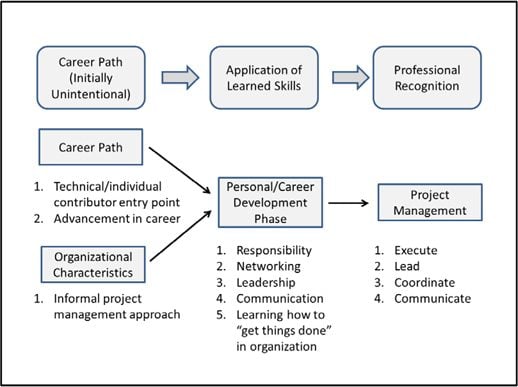
Source: UTS ePress
9) Get Education
Though you do not require a degree specific to project management, a qualification related to your industry of choice will enhance your project management career. In a survey conducted by PMI, 42% of project managers have a four-year bachelor’s degree, and 47% have a master’s degree. Only 1% of the surveyed professionals had landed a job with a high-school diploma. Having an advanced degree can help you land a job easily and, in the long run, will allow you to work your way up the career ladder.
10) Get PMP Certified
According to a study conducted by PMI, a project management certification-holder salary is 22% higher than a non-certified project manager’s salary. This is not just in IT but also across all industries. PMP certification is certainly one of the most effective ways for aspiring project managers to stand out and gain an edge over the competition. It is one the best testaments to your project management skills, techniques, and experience. It proves your credibility and tells your potential employers that you are capable of meeting project objectives within the set time and budget constraints. This is why a PMP project manager salary remains impressive across industries.
Develop These Skills to Improve Your Project Management Certification Salary
In addition to getting PMP certified, you can develop the following skills to increase your earning potential.
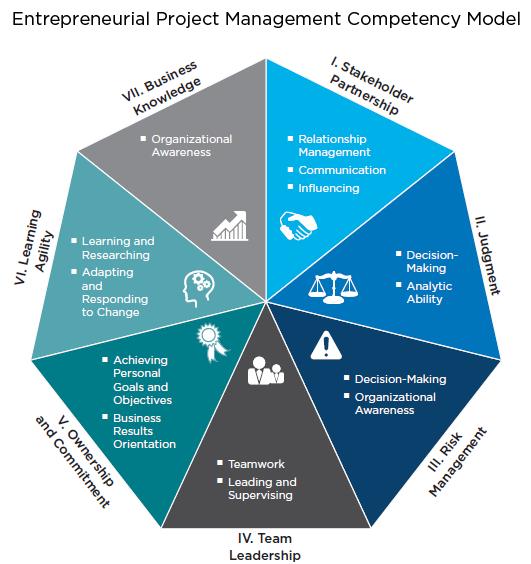
Source: CEBglobal
- Leadership Skills ─ A project manager needs to oversee multiple projects. He or she needs to keep the project team motivated and resolve conflicts when they arise. This is why leadership skills will give you more leverage.
- Budget Management ─ It takes a certain amount of skill to execute a project and finish it within the given budget constraints. A project manager who can allocate financial resources properly and make the most of them is considered an asset.
- Program Management ─ Program management involves managing multiple projects simultaneously. It is a set of multi-tasking skills that can add great value to organizational performance.
- Strategic Management ─ Failed projects can cause significant damage to business growth. Strategic management of projects will help an organization meet its objectives on time. Apart from setting schedules and managing time, a strategic project manager will make sure everything runs smoothly from start to finish.
GreyCampus is a PMI Authorized Training Partner (ATP) and a leading provider of PMP certification training. If you are looking for quality mentorship, access to top learning materials, simulated tests, practice questions, audio/video lectures, and assured 35 contact hours, GreyCampus is your best choice. The bootcamp is a 6-month intensive training program designed to help candidates crack the PMP certification exam in one go.
Want To Increase Your Earning Potential? Supercharge Your Skills With PMP Training Bootcamp!